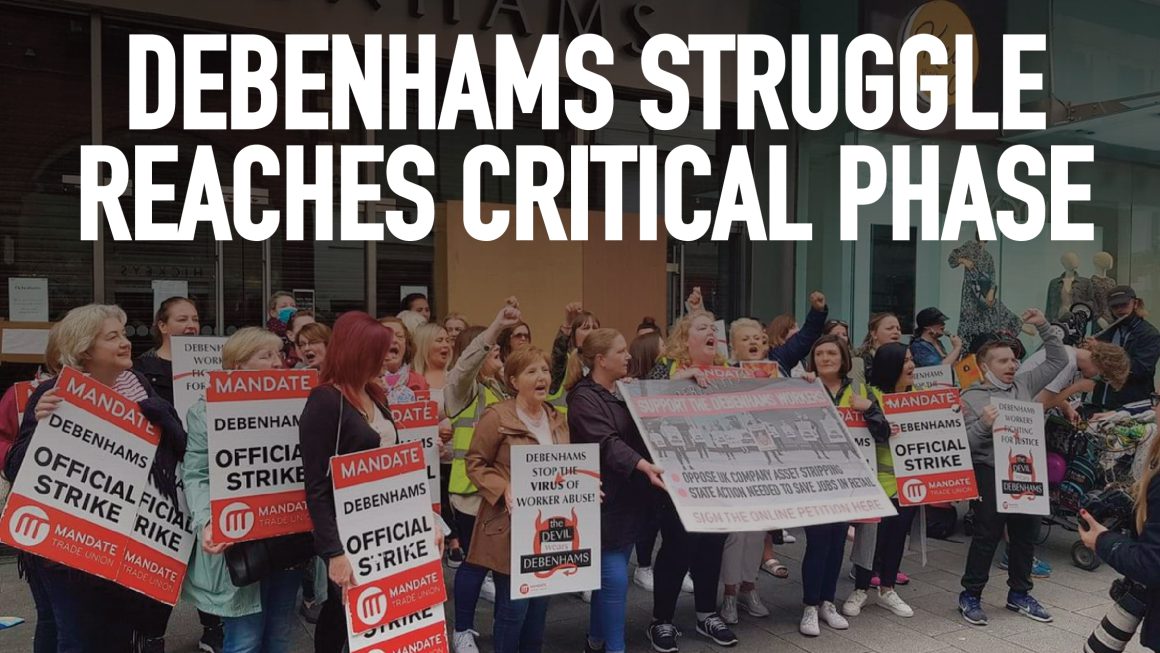By Michael O’Brien
Efforts over the last week by KPMG, the court appointed liquidator, and other concession companies to remove stock from Debenhams shops around the country have met with a determined response from workers and their supporters in many areas bringing their struggle for a just settlement onto a whole different level.
Pickets have been stepped up in the stores. Vans and trucks attempting to remove stock have been successfully blocked. These are the necessary actions implicit in the 97% vote in favour of industrial action when the workers were balloted in late May by their union MANDATE. The ballot provided for action if there was an attempt to liquidate the stock prior to agreement with the workers on how the proceeds of the sale be allocated.
The effect on the morale and confidence of the workers who have participated in these actions is palpable. A number of workers have said to me that they are doing things now that they would have never imagined possible for them to do only a few months ago. More Debenhams workers across the country are stepping forward for picket duty inspired by the strong stand of their colleagues.
That the struggle has reached this point at all has to be seen in light of what took place at earlier stages going back to March when the threat of closure was first posed. In the months prior to the recent escalation a significant section of the workforce in Debenhams successfully kept alive the struggle for a just settlement throughout the lockdown with imaginative protests on the stores, the Bank of Ireland (a significant shareholder) and at the Dáil. The demands were not just confined to enhanced redundancy payments but legitimate demands about saving jobs on the basis of state intervention were also raised and hold true to the present.
The initiative for sustaining a purposeful campaign through the lockdown months rested largely with a number of shop stewards and workers collaborating on numerous Zoom calls with public representatives and activists with experience in militant campaigning tactics especially Socialist Party member and Solidarity TD Mick Barry and former TD Ruth Coppinger. Together there was a strong view that a passive fatalistic approach for months on end pending the lifting of the lockdown would have totally sapped morale and made it difficult to mount effective pickets at the decisive stage.
What next?
With a raft of court cases being taken against the liquidator by various creditors there is massive pressure on them to proceed with the disposal of the stock in the eleven stores. However if they achieve this there will be nothing in it for the workers by way of an enhanced redundancy package as things stand.
In the normal course of events a liquidator or employer in these situations will seek help from the courts and/or the Garda to force through the removal of stock beginning with obtaining a court injunction.
Over the last week KPMG have effectively been testing the limits of the workers hoping that they could bully their way into loading trucks with the stock and effectively bringing the struggle to an end. However the determination of the workers, overwhelmingly women with long service in the company, to not allow the stock out makes the injunction route a distinct probability but one which KPMG would be nervous about because of the deep sympathy in society for the workers that could turn into actively expressed anger directed not just against the liquidator and the UK parent company but also the government that let this happen if workers were to end up in court for legitimately defying an injunction.
Such are the pro-employer anti-trade union laws in this country that it is very difficult to win an industrial campaign within the letter of the law which in reality only permits token ineffective picketing. This is why judges frequently issue injunctions at the request of employers in these situations. Unfortunately this reality leads unions including MANDATE in this instance to advocate an ultra cautious approach to their members on how picketing should be done but the workers instinctively know that without militant blocades the struggle will go down to defeat.
What can the Debenhams struggle achieve?
It is well understood by the workers that the rigged laws as they stand do not provide for the workers to get an enhanced redundancy package as of right. Therefore this struggle is in large measure about conquering new rights for workers in liquidation situations as well as a settlement for the Debenhams workers.
The type of reform that would aid this was established in a government commissioned report, Duffy-Cahill, written in 2016 in the aftermath of the Clerys closure. This would stop some of the game playing companies engage in in moving their assets between parent and subsidiary companies to avoid liabilities. Yet this change of law has not introduced four years on.
A vague promise is in the new programme for government but the new Taoiseach while expressing sympathy for the workers is not showing the same urgency for progressing legislation compared to when he was last in government and he helped ram through the banking guarantee overnight. Besides the Duffy Cahill report recommendations workers need to be placed at the head of the queue in liquidation situations and not in third place behind secured business creditors and the Revenue.
In the specific case of Debenhams even without the above laws strong pressure could be applied for the Revenue to forgo the €5 million it is due and that be used towards the funding of a decent settlement for the workers. Overall the settlement the workers are seeking of four weeks per years service would cost €13 million. The stock they want to liquidate is valued at €19.5 million
Significant political pressure has to be built up to force the government to act. The Dáil is in session for the remainder of July and no day should pass without the government being challenged on Debenhams. Other measures including an appeal for pickets on stores in the North and Britain to hit the businesses there should still be organised now that the lockdown has been eased.
The trade union movement at leadership level has been frankly derelict in not throwing the full weight of the movement behind this struggle. Regrettably among official circles in the trade union movement there is a pessimistic view that the workers don’t have a legal basis to get a share of the proceeds of the liquidated stock and that’s the end of the story as far as they are concerned.
What they forget is that any significant rights workers have today are rooted in past struggles that were similarly at the time seen as against the odds. So it is the Debenhams workers and their supporters who are reviving what is best about the trade union movement and stand in the tradition of Connolly and Larkin and are deserving of our active support.










